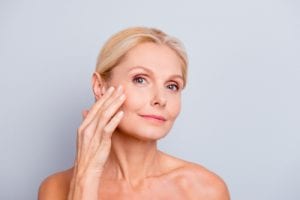How To Repair Aged and Sun-Damaged Skin
Most of us are born with naturally smooth skin. However, as we age, moisture levels drop. This can result in dry skin that may have a rough, uneven texture. Roughness may be the first sign of sun damage, which depletes collagen and dehydrates the skin. It can also be a sign of a chronic skin condition such as rosacea or eczema, which cause redness, bumps, and inflammation.

Have you been spending too much time in the sun? While sun damage does not happen overnight, it can seem to appear out of nowhere. The more we are exposed to the sun, the more collagen and elastin in the skin are broken down, providing less support to the skin’s surface and the underlying muscles. As a response mechanism, the skin tries to protect itself from the damage and will sometimes thicken as a way of regeneration.
How to Treat Sun-Damaged Skin
Whatever the cause, there are a variety of topical treatments and non-invasive procedures that will help with skin tone and texture.
Professional Skin Treatments
Treatments such as microdermabrasion and chemical peels help to repair sun damage and improve the tone and texture of the skin. These treatments have minimal downtime and can take a few treatments to repair the damage. These treatments remove the top layer of skin and encourage new cell growth.
Microdermabrasion
In-office resurfacing procedures will give you quicker, more dramatic effects. Microdermabrasion uses medical-grade aluminum-oxide crystals to polish away the top layer of skin, eliminating roughness and softening fine lines and wrinkles. It is safe for all but very sensitive skin types.
Chemical Peels
Chemical peels are other in-office options. There are many types of peels that use ingredients such as alpha hydroxy, glycolic, retinoic, or trichloroacetic acid. These peels help repair skin tone, texture, and hyperpigmentation by removing the top layer of skin.
Light-Based Procedures
Light-based procedures such as red light therapy or laser resurfacing treatments work to repair the skin and rejuvenate new cells. Red light therapy can help to lighten age spots and increase collagen production to treat fine lines and wrinkles on the face. This treatment has no downtime, but several sessions may be required. Fractional lasers like Fraxel® can help get rid of discoloration while improving the skin’s texture and collagen production by creating microscopic wounds in the skin. As the skin heals, the damaged areas scab and flake off.
HydraFacial®
HydraFacial® is a hydradermabrasion treatment that takes only 30 to 45 minutes to complete and can be used to treat a variety of skin concerns, including:
- Hyperpigmentation
- Sun damage
- Fine lines and wrinkles
Different attachments are used to exfoliate, cleanse, and moisturize the skin. The treatment is very gentle and does not require any downtime. HydraFacial® can also be combined with red light therapy to maximize your results.
How to Maintain Youthful Skin
Once sun damage has been corrected, the skin will want to regress, so protection and maintenance are vital. We recommend that you use a daily sunscreen with ingredients that contain either physical or chemical blockers and broad-spectrum products to protect from all UVA and UVB rays.
When you are purchasing moisturizers or other skin care products, make sure that they are rich in hyaluronic acid. This will hydrate and soften the skin. Exfoliation is also key. Exfoliation encourages cell turnover and promotes smoother, softer skin.
Peptides, antioxidants, and vitamin A should be used consistently to help strengthen the skin and improve texture. Retinoids (vitamin A formulations) are important because they help remove the top layer of skin and strengthen it from the inside out. Free radical-fighting ingredients like green tea and vitamins C and E can help safeguard your skin against future damage.
If you are ready to start repairing your aged or sun-damaged skin, contact our La Jolla location at (858) 565-7588 or our Kearny Mesa location at (858) 565-7588 to schedule a consultation.
